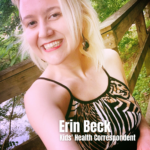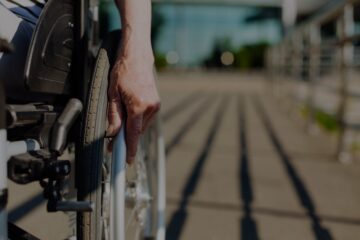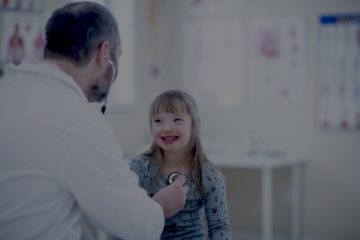By Erin Beck, writing for the “When All Are Counted” Project
There is power in numbers. But even though there are kids throughout West Virginia who look like JaQue Galloway’s kids and kids who have the same disabilities, her family often fends for themselves.

JaQue and her oldest son
Galloway’s 7-year-old son Kannon has Down syndrome, autism, heart defects, and vision and hearing impairments. Her 3-year-old son Knox has global developmental delay.
The Think Kids “When All Are Counted” Project is researching the lack of data West Virginia has on certain marginalized populations in the state, including children with disabilities, the LGBTQ+ population, and the Black community.
We know that before we can meet the healthcare needs of these populations, and build a more welcoming, inclusive, and supportive healthcare system and overall environment, we must also understand the demand and the need.
In Galloway’s case, she’s observed that healthcare providers are ill-equipped, or feel ill-equipped, to meet the needs of her two biracial sons. Galloway, of Wheeling, said they often travel to Pittsburgh.
“I’m raising Black boys,” she said. “So for them to be able to go into cities where there’s diversity, and where there are resources for people with disabilities, and they are more inclusive in all the areas that they might be vulnerable in, to us that feels safer.”
Her son had an asthma attack last year, and doctors in Wheeling sent him to Pittsburgh. They see a laundry list of conditions and get scared, she said.
“If you or I presented and there was an asthma attack, they would treat us,” she said. “They would say, this is what we do. But I think that they are scared. And I think that they know that they’re not equipped to provide treatment to people with disabilities.”
“And so then we’re in Pittsburgh, and Pittsburgh is rolling their eyes at us like you guys should have been treated.”

JaQue’s youngest on his way to school
They travel an hour.
We talked about how if kids are being treated out of state, the incentive for the healthcare system to improve to meet their needs here isn’t as clear, because her kids aren’t counted. Especially because now, they go straight to Pittsburgh.
“So you wouldn’t get those numbers because we didn’t start at Wheeling,” she said.
She also senses providers are more hesitant to talk about conditions more common among the Black population.
“I don’t think it was ever ill-intended,” she said. “But the demographics were just not there.”
Her son also had jaundice, but a doctor didn’t recognize it.
She also noted that racism is a sensitive subject, especially now. And that some providers may be racist, or be afraid of being perceived that way.
“The patients that these providers are seeing are not people of color, and not because of accessibility, but because of the numbers,” she said.
She also sees him being treated differently because providers assume he won’t understand them. She’s seen him be held down for procedures, such as a shot.
“Don’t expect my son to understand everything, the entire process, but he would cooperate if you spoke with him,” she said. “No one wants to be talked to like that.”
She wants to see them introduce themselves and explain what’s going on, she said, “like any other kid.”
“I know he does pick up on that,” she added.
We also talked about how if adults needlessly “baby” kids with disabilities, those kids may grow up to be less equipped to take care of themselves and live independently.
“It feels like a respect thing to me,” she said. “At some point, he is going to have to be able to make his own decisions. And I don’t feel like providers are ready for adults with disabilities, especially IDDs (intellectual and developmental disabilities) to be independent.”
The “When All Are Counted” Project’s first set of focus groups, exploring each group’s identity and how that contributes to their sense of belonging and support in their communities, kicked off in Wheeling this week.
Galloway, who is on the advisory board, does feel her family has some support. But while some populations have large advocacy groups, and therefore a chorus of voices advocating for them, she doesn’t know of any overarching advocacy or support group she could turn to. She only recently found out help paying for pull-ups was available, because another parent mentioned it.
She does have some support from other families with children with disabilities, but it comes from out of state.
There are “pockets of support” here, she said. For instance, the Down Syndrome Network of WV has been helpful. But her son has several disabilities.
She also notices a lack of physical accommodations at places like playgrounds, where there would be opportunities for socialization. But her son needs large changing rooms. They need a place to use a ramp.
So they mostly stay home.
Her support, she says, mainly comes from the Black community, even if that’s only about five families in Wheeling.
“That has been the community that has shown him the most respect and actually held him accountable for what I know he’s capable of,” she said.
“And we all know each other. We all have grown up with each other. So when I had my kids, it was like, oh, yeah, okay, those are just my kids…. I appreciate that because they respect my son as a kid before anything else.
Get connected
Join our project email list, so you can stay up-to-date on upcoming focus groups, surveys, and blog posts about prevailing themes, challenges, and ways you can help build a more equitable and inclusive health surveillance system.




0 Comments